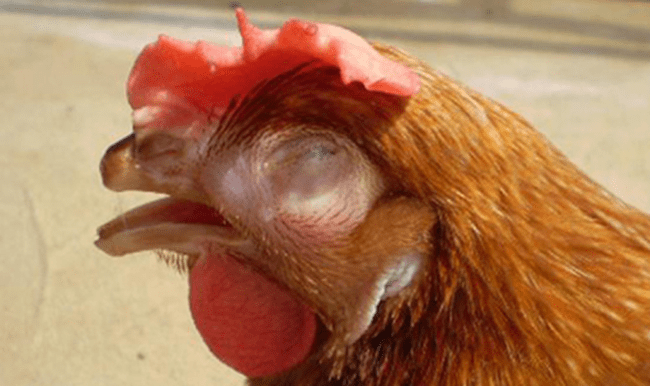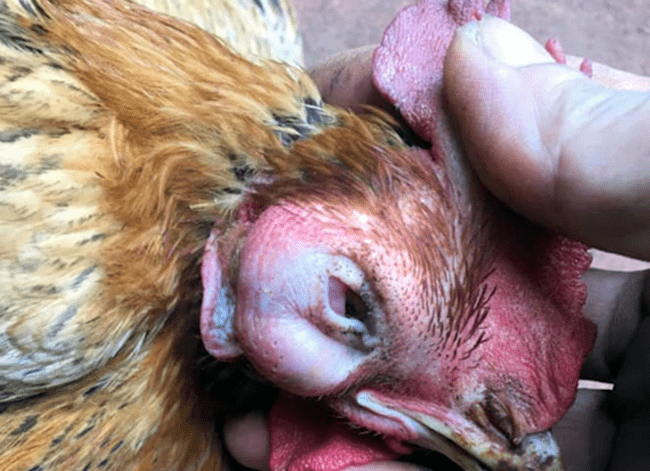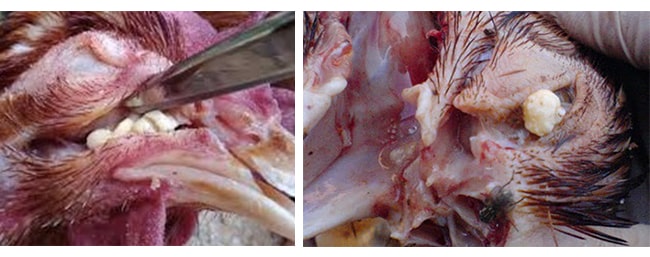Coryza, also known as infectious coryza, is a disease that occurs in chickens and is characterized by specific symptoms such as watery eyes, runny nose, and swelling of the head. The disease is found in chickens worldwide and causes the most severe damage in large-scale poultry farms. To address concerns about the disease, Goovet would like to present 6 treatment regimens for Coryza.
Causes of coryza (infectious coryza in chickens)
Coryza is a respiratory tract infection in chickens caused by the bacterium Avibacterium Paragallinarum. The disease primarily affects laying hens and can cause significant damage, the disease can result in a decrease in egg production ranging from 5-10%, and in severe cases, it can even reach up to 40%.
Wild bird species are believed to serve as reservoirs for the disease, and are the main cause of disease outbreaks in poultry farms. The disease can spread from sick chickens to healthy ones.
Symptoms of coryza (infectious coryza in chickens)
- The chicken's eyes is inflamed, and the eyelids are stuck together, preventing the chicken from opening its eyes.

Picture 1: The chicken is unable to open its eye.
- The chicken has a runny nose and teary eyes. The initial inflammation is thin and watery. Later, it becomes thicker and white like pus, and it has a foul odor.

Picture 2: The chicken has white, pus-like discharge from its eyes
- As the disease progresses, the thick mucus solidifies into cheesy exudate in the eyes and mouth cavities.
- The chickens experience swelling and edema in one or both sides of the head. The accumulated exudate obstructs the respiratory tract, make the chickens be difficult for breathing, cause cough and the mortality rate increases rapidly due to secondary bacterial infections.

Picture 3: The chicken has a swollen and puffy head.
The consequences of coryza (infectious coryza in chickens)
- Sinusitis below the eyes socket. There is yellow-colored pus that forms a lump in one or both sides of the sinus below the eyes socket.
- Pneumonia.

Pictures 4: There is yellow-colored pus that forms a lump in one or both sides of the sinus below the eye socket.
Prevention of coryza (infectious coryza in chickens)
- It is important to note that after each batch of raising chickens, the poultry house should be thoroughly cleaned and left empty for a period of time.
- Regularly disinfect the poultry house by spraying POVIDINE - 10% (10ml/3 liters of water). This disinfection process should be carried out 1-2 times per week.
- Preventing diseases with vaccines (according to the manufacturer's recommendations).
- Regularly boosting immune function: HERBAL ELECTROLYTES GLUCO K+C + GLUCAN GARLIC NEW Dosage: 1g/2 liters of water.
Treatment regimens for coryza disease (infectious coryza in chickens)
Step 1: Cleanliness and disinfection of the breeding area
- Clean all feeding troughs, drinking troughs, and soaking medication containers using G-OMNICIDE (100ml/15 liters of water).
- Spray disinfectant throughout the external and internal areas of the breeding facility using G-OMNICIDE at a dosage of 1 ml/1.5 liters of water, spraying once every 1-2 days.
- To minimize the damage caused by the disease, it is important to observe and detect the disease early. Separate the affected chickens into a separate pen to reduce the spread of infection.
- Additionally, sprinkle LIVESTOCK BEDDING (PROBIOTIC BEDDING FOR LIVESTOCK) on the floor of the breeding area to reduce toxicity, eliminate odors, and control the growth of bacteria.
Step 2: Symptomatic treatment
- Using cough and expectorant medication: Using BROMHEXIN 10 at a dosage of 1g/7-10kg B.W or BROM-MENTHOL at a dosage of 1 ml/4-8 liters of drinking water.
- Using antipyretic medication: Using PARA-C at a dosage of 1g/4-6kg B.W or ANAGIN-C at a dosage of 2-4g/1 liter of water until the fever subsides.
Step 3: Antibiotic treatment for disease control and immune enhancement.
Regimen 1:
- Morning: Use AMOX-S 500 orally at a dosage of 1g/30 kg body weight.
- Afternoon: Use HERBAL ELECTROLYTES GLUCO K+C + SORBITOL B12 + LACTIC at a dosage of 1g/1 liter of water.
Treatment duration: 5-7 days.
Regimen 2:
- Morning: Use DOXY - Z500 orally at a dosage of 1g/50 kg body weight.
- Afternoon: Use NH-ADE-B.COMPLEX at a dosage of 1g/4 liters of water or VITAMIN C 35 at a dosage of 1g/3 liters of water or LACZYME at a dosage of 1g/1 liter of water.
Treatment duration: 5-7 days.
Regimen 3:
- Morning: Use GENTADOX 150 orally at a dosage of 1g/5-10 kg body weight.
- Afternoon: Use HERBAL GLUCO K-C at a dosage of 2g/1 liter of water or β-GLUCAN 50 at a dosage of 1g/1 liter of water or BACILLOZYM @ at a dosage of 1g per 2 liters of water.
Treatment duration: 5-7 days.
Regimen 4:
- Morning: Use TIMICOSIN-2500G orally at a dosage of 1 ml/12 kg body weight.
- Afternoon: Use ELECTRO GLUCO KC + STRONG LIVER + HIGH GLUCAN GARLIC at a dosage of 1ml/2 liters of water.
Treatment duration: 5-7 days.
Regimen 5:
- Morning: Use TYLODOX orally at a dosage of 1g/10 kg body weight
- Afternoon: Use B.COMPLEX C NEW at a dosage of 1g/2 liters of water or SPOBIOZYM at a dosage of 1g/1 liter of water or SORBITOL B12 at a dosage of 1g per 1 liter of water.
Treatment duration: 5-7 days.
Regimen 6:
- Morning: Use G-TYLVASIN MAX orally at a dosage of 1g/50-60 kg body weight.
- Afternoon: Use VITAMIN C 15 + SORBITOL B12 + MAX - ZYM B1 (soluble) at a dosage of 1g/1 liter of water.
Treatment duration: 5-7 days.
For chickens with severe symptoms:
- If there is pus in the eyes, gently squeeze out the pus and use GEN-DEXA eye drops (1 drop per eye per time) for 3-5 days.
- Use injectable antibiotics: Use TYLOGENT 200 at a dosage of 1 ml/5 kg body weight or use LINSPEC NEW at a dosage of 1 ml/5 kg body weight or use AZIFLOR NEW at a dosage of 1 ml/10 kg body weight.
- Administer the antibiotic injections continuously for 3 days.
- DEXA can be combined at a dosage of 1ml/10kg body weight to reduce inflammation.
Note: For egg-laying chickens, it is important to supplement nutrients to support their reproductive health and egg production. You can use the following options:
Option 1: Use ADE-VIT C + CALCIUM + B12 NEW to provide essential vitamins and minerals for egg production. Use continuously for 1-2 weeks.
Option 2: Use SUPPER EGG + STRONG BONE to stimulate egg production and provide necessary calcium and minerals. Use continuously for 1-2 weeks.
With 6 above treatment regimens for Coryza (infectious coryza) in chickens, Goovet is confident that farmers will be successful in treating this disease!
